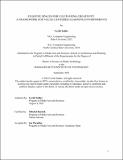| dc.description.abstract | In today's world, there is a growing recognition of the importance of creativity and curiosity as essential 21st-century skills. Efforts to expand access to technology-mediated creative learning experiences have become widespread. However, oppressive structures in education systems hinder and stifle the participation of all young people in these opportunities for self-expression and agency, particularly Black youth who are negatively impacted by the pervasiveness of anti-Blackness.
This thesis proposes a framework for value-centered learning environments. Through the application of BlackCrit’s theory of anti-Blackness as a lens for analyzing experiences, the holistic design of these learning environments aims to cultivate a sense of fugitive space –purposefully constructed out-of-school spaces for practicing radical imagination. These spaces offer transformative creative learning experiences with computing, challenging anti-Blackness in education and embracing liberatory fantasy. The learning environment encompasses the tools and materials, physical space, pedagogy, and community culture. The core values – accountability, authenticity, awareness, and adaptability – are put into practice by: doing the work, showing up, checking in, and embodying change.
The exploration is conducted in the context of a local community-based grassroots organization, blackyard, that centers Black youth and their families by offering after-school programming. Through design-based approaches and critical inquiry, creative learning workshops, interviews, and immersion are employed to explore the values that underpin ways of being, knowing, and acting, fostering creative and playful learning experiences for Black youth. By centering Black youth and their communities, this thesis opens a dialogue, explores tensions, and encourages persistent dreaming about opportunities that center the humanity and dignity of the learner, celebrate curiosity and imagination, and challenge oppressive narratives in education about who is worthy and capable of the rights to creativity and play. | |
